The LA kids who started behind and then flew ahead
- Published
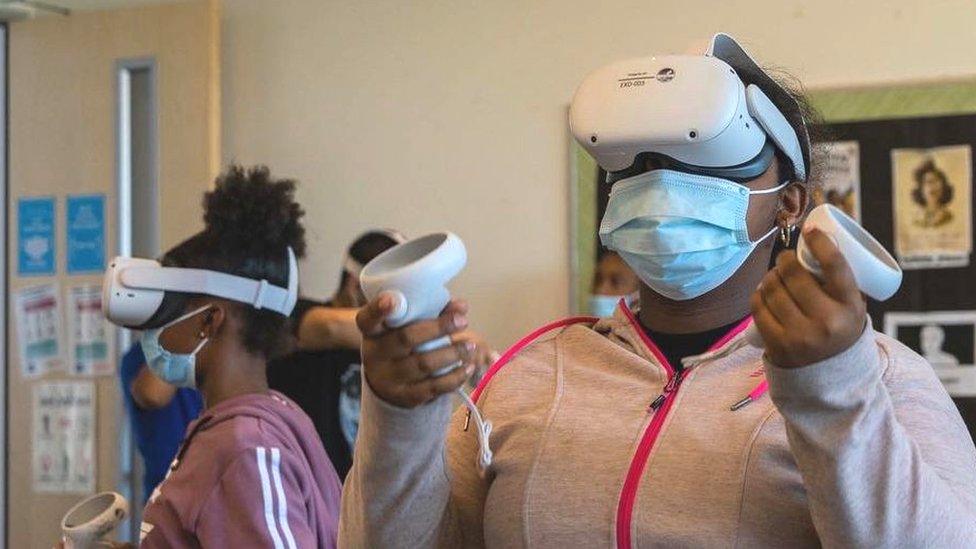
For some students learning in virtual reality builds confidence
South Central Los Angeles is an area that has been tarnished with a troubled image. Both Hollywood and real-life crime stories have seen to that.
Carlos Oyarbide, who teaches English Language Development in South Central LA, is all too familiar with its reputation as a regular visitor.
"There's truth in the violent stereotype, but I choose to teach there. It is an immigrant hub with a great sense of loyalty and community. And that community has an entrepreneurial spirit."
That spirit has been harnessed at Mr Oyarbide's school, Nava College Preparatory Academy. The school was the trial site for a scheme that has pitched using the metaverse to help teach English to students with a limited grasp of the language.
The term metaverse is used to describe a series of virtual reality worlds that can be accessed through a browser or virtual reality (VR) headset.
The idea behind the scheme is to harness the power of VR technology to bypass traditional teaching methods and plunge students into a world of possibility in a virtual universe.
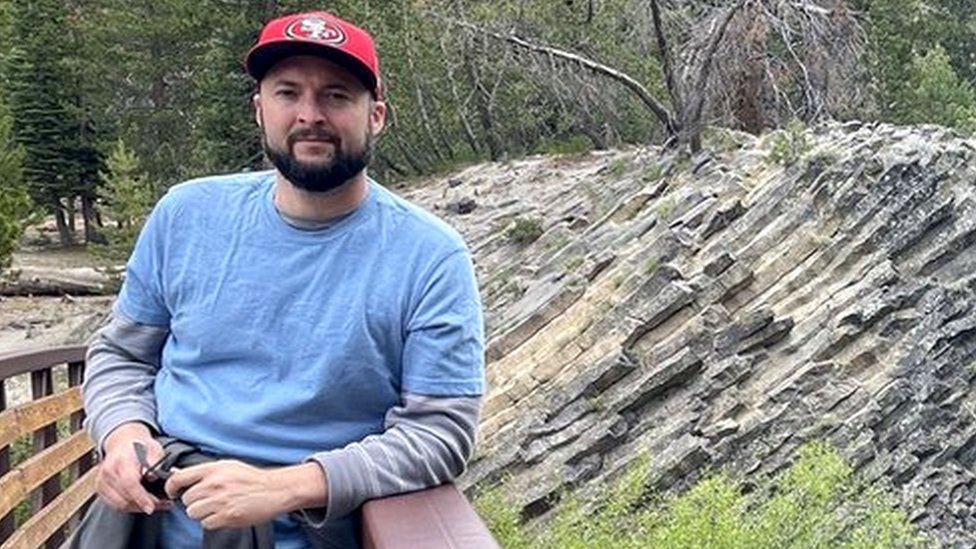
Teacher Carlos Oyarbide wanted to try something different
The idea that VR can be used to boost learning isn't new. In 2020, a study by business consultants PwC, external found that through the use of VR students could learn up to four times faster than in a traditional class setting.
However, the falling price of VR headsets has now made them a more affordable teaching aid.
For Mr Oyarbide, the possibility of sharpened focus among his easily distracted students had huge appeal.
"I've been teaching for 12 years. If kids can figure out anything it is how not to pay attention! I wanted to try something different, do normal learning from books for one period and then switch to VR."
In doing this, he discovered that a VR environment swept away the inhibitions of many of his students wrestling with learning a new language.
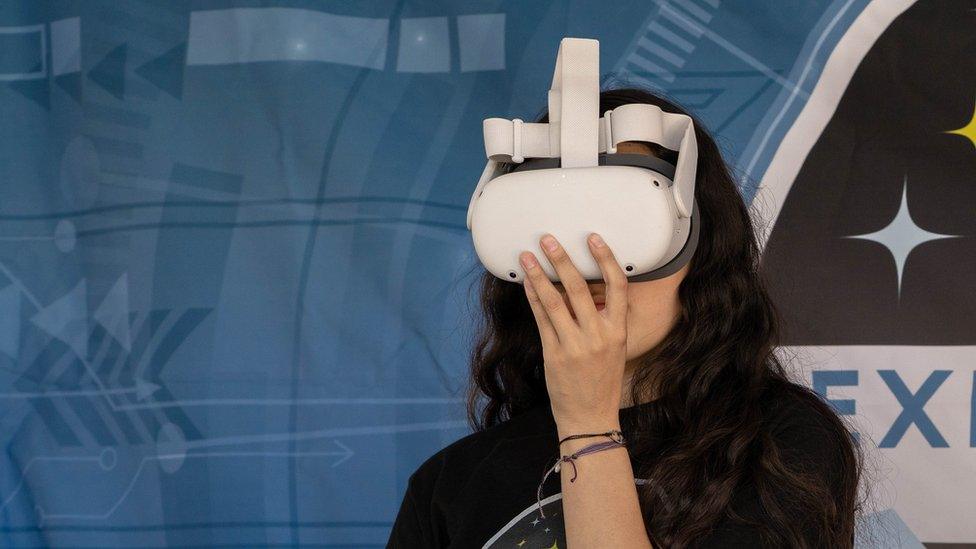
The price of VR headsets has been coming down
He says the technique helped them practise their language skills without embarrassment.
Typical tasks performed by his students inside the VR classroom involved building a shop while working out the English language required for signage and advertising.
Students would usually use the VR equipment for two or three hours a week.
"They can feel intimidated speaking in English, but when it's just them and a VR avatar that's completely different."
Despite the positive impact VR has had on his teaching methods, Mr Oyarbide is not a starry-eyed convert to the avalanche of metaverse hype typified by Facebook's rebranding as Meta.
He says there is still great advantages to a traditional classroom setting.
"The old approach to teaching through books does not go away. And you're not going to wear a headset for four hours a day. But it does allow you to reduce teacher talk and create a tangible space for a student's confidence to grow."
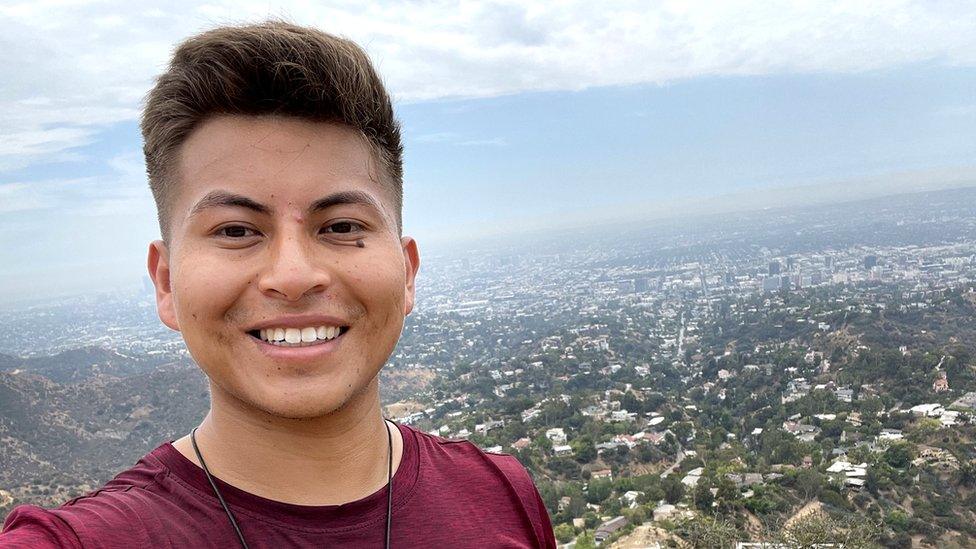
Marco Vargas won a scholarship to a prestigious Ivy League college
Meanwhile, Marco Vargas's parents moved to Los Angeles from Guatemala.
"I'm a first-generation everything - first-generation American and first-generation high school graduate. In high school I learnt how to navigate the education system and how to use resources by myself."
As part of the first cohort to go through Nava, he missed the more modern VR headsets that are now used.
Instead, Mr Vargas had a more stripped-down VR experience, using a cardboard viewer attached to a smartphone and Google software.
Nevertheless, he says that his high school's embrace of technology was important for his own academic development.
The immersive aspect of VR learning appeals to him, but he can also be critical of how his younger generation can take technology for granted after having it at their fingertips for so long.
"Yes, we are digital natives, but we lack discipline. We fall prey to distractions."
Proving that he could overcome any distraction, Mr Vargas won a Fulbright scholarship to study at Dartmouth, a prestigious Ivy League university.


Today, he works for Exponential Destiny, a non-profit organisation dedicated to introducing students at schools in disadvantaged areas to emerging technologies. It was Exponential Destiny that provided the VR headsets to Nava College.
Marcus Shingles runs the firm. He was a high-flying business consultant at top-tier firms where he demonstrated new technologies to business leaders, and happily contrasts himself with his students.
"I'm a rich white guy," he says.
Now, he is helping to plot routes into technology for teenagers who had previously never considered that such a career could be possible for them.
"It's clear that the internet is evolving, so we take the time students have invested in mastering platforms like TikTok and show them that developing products in the metaverse doesn't require hard coding."
He says the falling price of VR headsets is a chance to make the technology more accessible.
This approach to embedding metaverse technologies in teaching attracts students who don't see themselves as tech-oriented.
Many of the students that have gone through Exponential Destiny are hired to help out at other schools and expand the scheme.

Initially Samantha Aguilar Araujo did not see herself as a tech person
Samantha Aguilar Araujo, the daughter of Salvadoran parents and the first in her family to attend high school, is one of them.
"I didn't consider myself a tech person, I'm definitely more on the creative side, but I heard about a new class and took it to see what it was like."
She became enamoured with a virtual approach to building computing programs that bypasses traditional coding techniques that alienate many of those who aren't technologically adept.
Fuelled by artificial intelligence this VR method is often referred to as no-code coding.
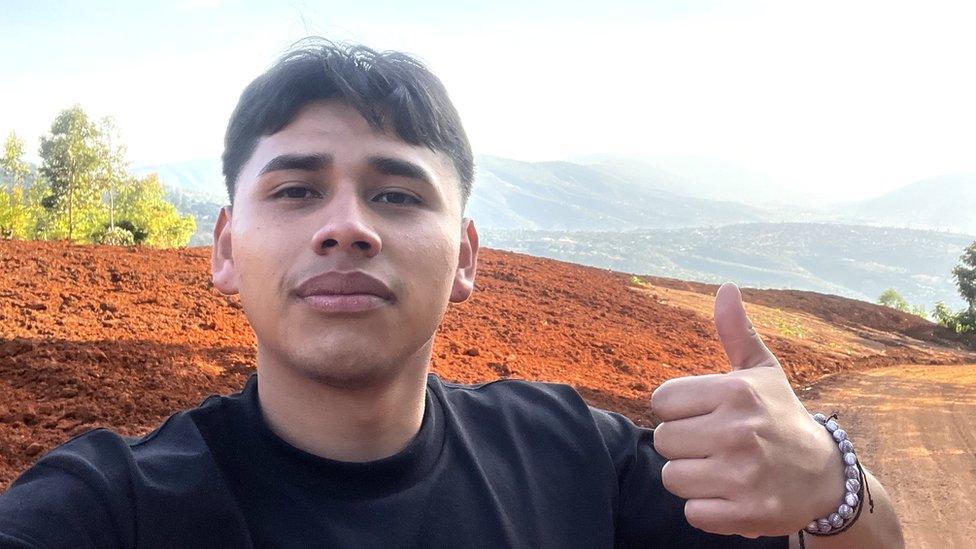
Juan Felix says VR helps students learn quickly
More students in the US and overseas are likely to see these VR techniques in the coming months.
Exponential Destiny has projects running in four schools at the moment, with plans to introduce the system to another two in the US and four schools outside the US.
Back at Nava College a former pupil, Juan Felix, has returned to take a class of 18 students with limited English through the technology maze.
His students discover routes into college or a career in a VR world where they can pull together the elements of covering letters and job application forms.
"It is crazy. They're not speaking English as a first language and they've not been exposed to the technology before, but despite these barriers they learn very quickly," he says.